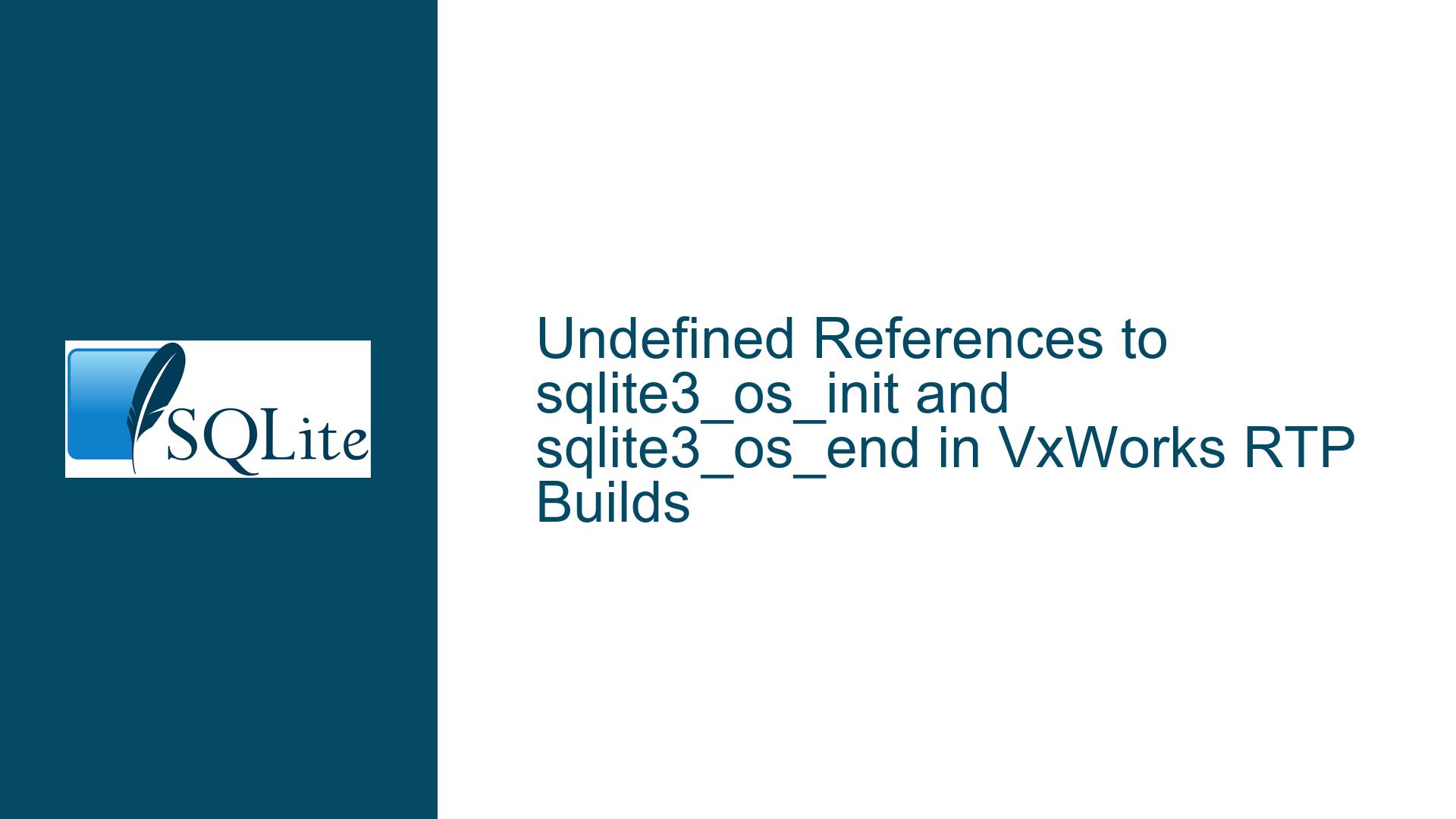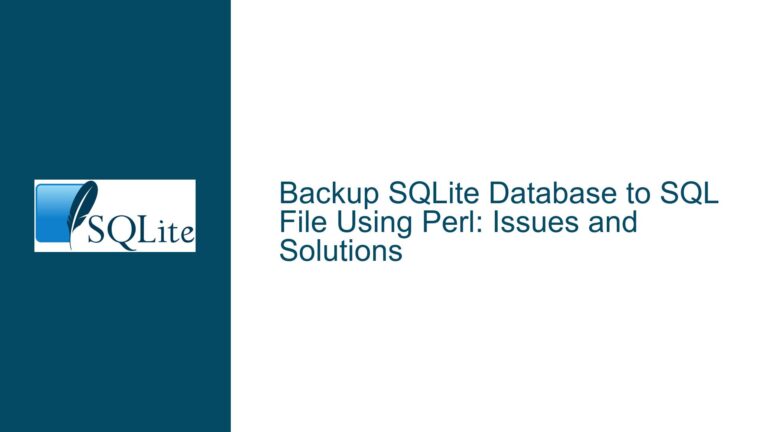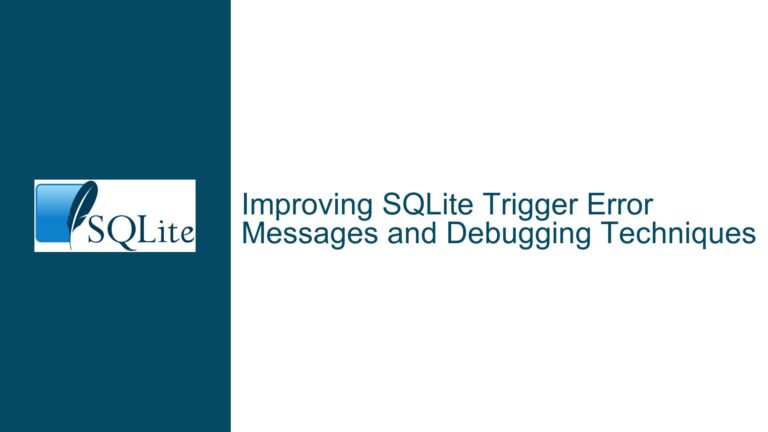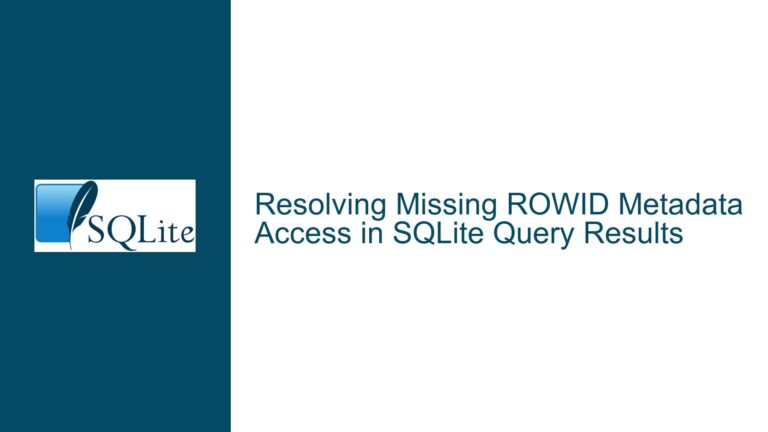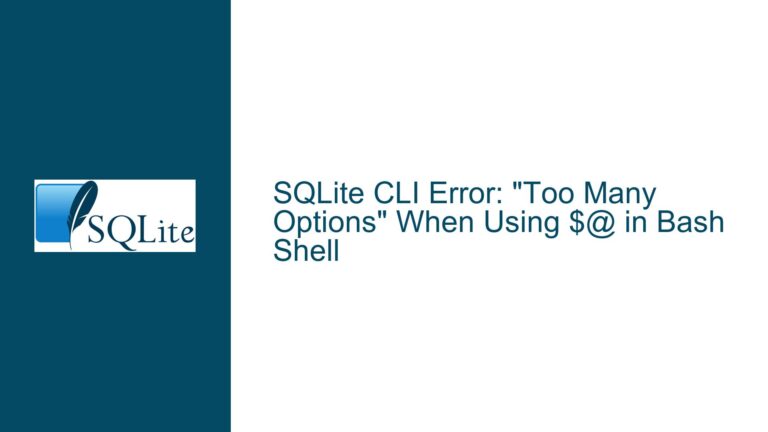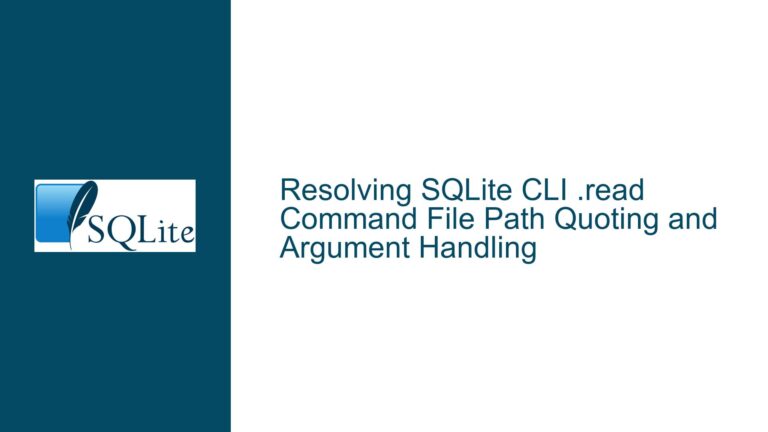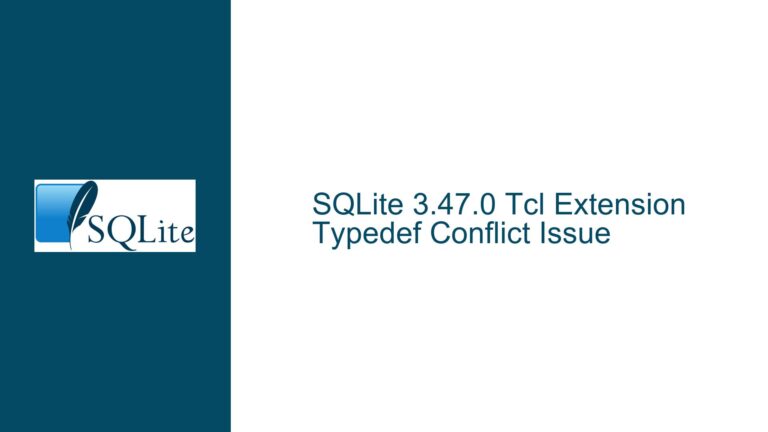Undefined References to sqlite3_os_init and sqlite3_os_end in VxWorks RTP Builds
SQLite OS Adaptation Layer Implementation Gaps in VxWorks RTP Projects
1. Root Cause: Missing Platform-Specific OS Interface Functions
SQLite relies on platform-specific implementations of low-level operating system (OS) interfaces for operations such as file I/O, memory management, thread synchronization, and process control. These implementations are encapsulated in two critical functions: sqlite3_os_init() and sqlite3_os_end(). The former initializes the OS interface during SQLite startup, while the latter cleans up resources during shutdown.
In SQLite versions prior to 3.40.0, the build system included default implementations of these functions for widely used platforms (e.g., Unix, Windows). However, for less common or proprietary operating systems like VxWorks, SQLite requires developers to explicitly provide these implementations. The undefined reference errors (sqlite3_os_init and sqlite3_os_end) indicate that the linker cannot find these platform-specific functions in the VxWorks RTP project.
The transition to SQLite 3.40.0+ introduces stricter separation of platform dependencies. The amalgamation source code now excludes default implementations for non-standard targets unless explicitly configured. This change aligns with SQLite’s design philosophy of minimizing unnecessary code bloat for embedded systems.
2. Key Triggers: Build Configuration and Version-Specific Compilation Flags
The error arises due to three interrelated factors:
A. Absence of SQLITE_OS_OTHER Compilation Flag
SQLite uses the SQLITE_OS_OTHER preprocessor macro to signal that the target OS is not one of the default supported platforms (Unix, Windows, etc.). When this flag is not defined, SQLite assumes the presence of a built-in OS interface. For VxWorks, which lacks a default implementation, this assumption leads to missing symbol errors during linking.
B. Implicit Reliance on Historical Build Artifacts
In pre-3.40.0 versions, certain build configurations might have inadvertently included partial OS interface code from other platforms (e.g., Unix) due to conditional compilation oversights. This allowed projects to link successfully without explicit VxWorks adaptations. Subsequent SQLite releases tightened these conditionals, exposing previously hidden dependencies.
C. Version-Specific Changes to OS Interface Requirements
Starting with SQLite 3.40.0, the build system refactored how OS interfaces are initialized. The dependency chain for sqlite3_initialize() (the global initialization function) became more explicit, requiring robust implementations of sqlite3_os_init(). Projects that previously "got away" with incomplete implementations now face strict linkage requirements.
3. Resolution: Implementing VxWorks-Specific OS Interfaces
Step 1: Define SQLITE_OS_OTHER in Build Configuration
Add the SQLITE_OS_OTHER macro to your compiler flags to disable SQLite’s built-in OS interface logic:
-DSQLITE_OS_OTHER=1
This instructs SQLite to exclude default OS implementations and expect custom versions of sqlite3_os_init() and sqlite3_os_end().
Step 2: Create a VxWorks OS Interface Module
Implement a new C file (e.g., sqlite3_vxworks_os.c) containing the required functions:
#include "sqlite3.h"
#include <vxWorks.h>
#include <ioLib.h>
#include <semLib.h>
int sqlite3_os_init(void) {
// Initialize VxWorks-specific file I/O, mutexes, etc.
// Example: Register VxWorks file operations
sqlite3_vfs *pVfs = sqlite3_vfs_find(NULL);
if (pVfs) {
pVfs->xOpen = vxworksOpen;
pVfs->xDelete = vxworksDelete;
// ... other function pointers
}
return SQLITE_OK;
}
int sqlite3_os_end(void) {
// Cleanup resources (e.g., semaphores, memory pools)
return SQLITE_OK;
}
Step 3: Integrate Custom OS Interface into the Build
Ensure the new OS interface module is compiled and linked into your RTP project. Update makefiles or build scripts to include sqlite3_vxworks_os.c alongside sqlite3.c.
Step 4: Validate Threading and Mutex Initialization
VxWorks requires explicit mutex configuration. Extend sqlite3_os_init() to set up mutexes using VxWorks APIs:
#include <semLib.h>
SQLITE_API int sqlite3_os_init(void) {
sqlite3_vfs_register(sqlite3_vfs_find("unix"), 0);
sqlite3_config(SQLITE_CONFIG_MUTEX, vxworksMutexMethods);
// ...
}
Step 5: Audit File I/O Operations for VxWorks Compatibility
Replace POSIX-style file operations (open(), read(), write()) with VxWorks equivalents (open(), read(), write() from ioLib.h). Ensure pathname handling accounts for VxWorks-specific conventions (e.g., device prefixes like "/tffs0/").
Step 6: Test with Minimal Configuration
Isolate SQLite functionality in a test RTP application to verify basic operations (database creation, table insertion). Use sqlite3_open_v2() with flags like SQLITE_OPEN_READWRITE | SQLITE_OPEN_CREATE to validate file system interactions.
Step 7: Address Version-Specific Behavioral Changes
Review SQLite’s changelog for 3.40.0+ to identify additional dependencies. For example, newer versions may require implementations of sqlite3_randomness() or sqlite3_current_time() if not already handled.
Final Step: Incremental Porting from Legacy SQLite Versions
If migrating from SQLite 3.39.4 or earlier, compare the os_unix.c or os_win.c files from older amalgamations to identify legacy code that previously "filled in" missing VxWorks functions. Adapt these snippets into your custom OS interface module.
This structured approach resolves the undefined reference errors by addressing the core requirement: providing a complete, platform-specific OS interface layer for VxWorks. By explicitly defining SQLITE_OS_OTHER and implementing the missing functions, developers can leverage the latest SQLite versions while maintaining compatibility with VxWorks’ real-time constraints.
